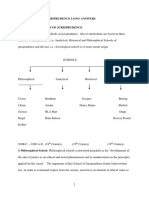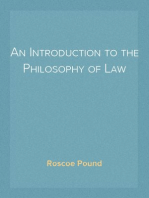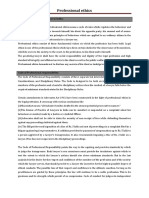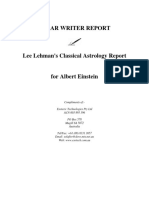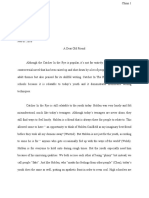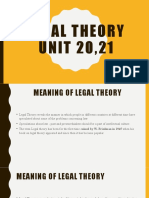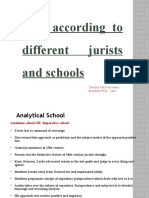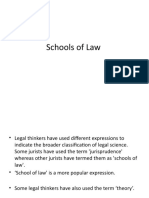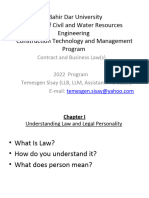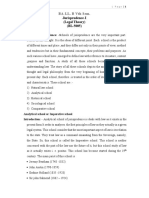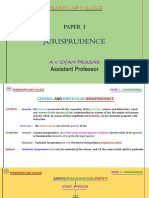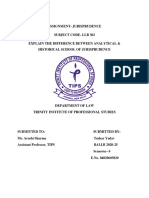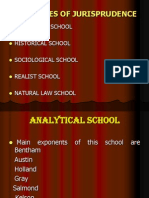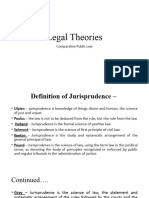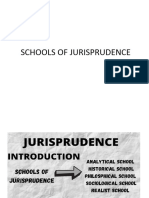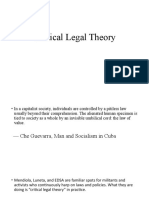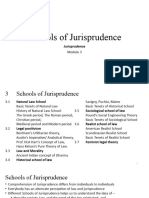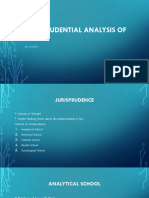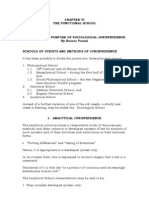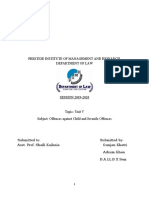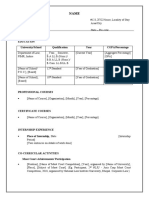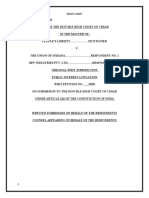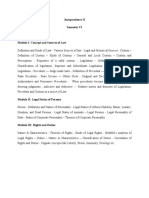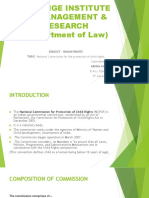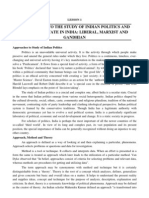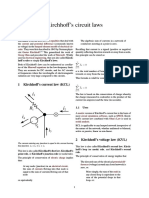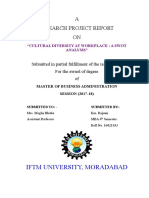0 ratings0% found this document useful (0 votes)
122 viewsJurisprudence
Jurisprudence
Uploaded by
Arhum KhanThis document provides an overview and comparison of the Analytical and Historical schools of jurisprudence. The Analytical school, developed in the 19th century, views law as the command of the sovereign. It focuses on positive law and the study of law as it exists. The Historical school originated in Germany in reaction to natural law theory and emphasizes the social institutions and evolution of law over time. The two schools differ in their views of whether law is created by the state or predates it, and whether judges should interpret statutes or consider historical context.
Copyright:
© All Rights Reserved
Available Formats
Download as PPTX, PDF, TXT or read online from Scribd
Jurisprudence
Jurisprudence
Uploaded by
Arhum Khan0 ratings0% found this document useful (0 votes)
122 views10 pagesThis document provides an overview and comparison of the Analytical and Historical schools of jurisprudence. The Analytical school, developed in the 19th century, views law as the command of the sovereign. It focuses on positive law and the study of law as it exists. The Historical school originated in Germany in reaction to natural law theory and emphasizes the social institutions and evolution of law over time. The two schools differ in their views of whether law is created by the state or predates it, and whether judges should interpret statutes or consider historical context.
Original Description:
jurisprudence
Original Title
Jurisprudence Ppt
Copyright
© © All Rights Reserved
Available Formats
PPTX, PDF, TXT or read online from Scribd
Share this document
Did you find this document useful?
Is this content inappropriate?
This document provides an overview and comparison of the Analytical and Historical schools of jurisprudence. The Analytical school, developed in the 19th century, views law as the command of the sovereign. It focuses on positive law and the study of law as it exists. The Historical school originated in Germany in reaction to natural law theory and emphasizes the social institutions and evolution of law over time. The two schools differ in their views of whether law is created by the state or predates it, and whether judges should interpret statutes or consider historical context.
Copyright:
© All Rights Reserved
Available Formats
Download as PPTX, PDF, TXT or read online from Scribd
Download as pptx, pdf, or txt
0 ratings0% found this document useful (0 votes)
122 views10 pagesJurisprudence
Jurisprudence
Uploaded by
Arhum KhanThis document provides an overview and comparison of the Analytical and Historical schools of jurisprudence. The Analytical school, developed in the 19th century, views law as the command of the sovereign. It focuses on positive law and the study of law as it exists. The Historical school originated in Germany in reaction to natural law theory and emphasizes the social institutions and evolution of law over time. The two schools differ in their views of whether law is created by the state or predates it, and whether judges should interpret statutes or consider historical context.
Copyright:
© All Rights Reserved
Available Formats
Download as PPTX, PDF, TXT or read online from Scribd
Download as pptx, pdf, or txt
You are on page 1of 10
PRESTIGE INSTITUTE OF
MANAGEMENT AND RESEARCH
Department of Law
Subject : Jurisprudence
Presented to :- Prof. Deepa Shrivastav
Presented by :- Gunjan Khatri
ANALYTICAL SCHOOL
INTRODUCTION
• Also known as Austinian or Imperative school.
• Treats law as command of sovereign.
• Gained prominence in 19th century.
• The exponents confine themselves to the study of law as it
actually exists i.e. Positus.
• Benthem breaks away from Natural Law and emphasized
Utility.
• Benthem propounds concept of expositorial jurisprudence
which deals with law as it is.
• Austin takes over the subject of expositorial jurisprudence and
subject it to detailed, thorough and searching analysis.
• His approach was secular, positive and impirical.
• Austin propounded theory of Positive Law.
MAIN EXPONENTS
• JEREMY BENTHEM (1748 – 1832)
• JOHN AUSTIN (1790 – 1859)
• SIR JOHN SALMOND (1862 – 1924)
• ERSKINE HOLLAND (1835 – 1928)
• H.L.A. HART (1907 – 1992)
• HANS KELSON (1881 – 1973)
CRITICISM
No legal system exists in a vacuum; hence cannot be
fully understood by focusing only on the law itself.
Modern trends suggest the blending of socio-economic
factors in the study of jurisprudence. Analytical School
conflicts with the usage of the term law as it does not
include customary law, international law and
constitutional law in its domain. The Analytical School
disregards the moral element in law which implies that
even unjust law is a law. Analytical school does not take
into account legal change. It takes for granted the
perfection of a legal system and proceeds to explain its
fundamentals. However, change is undoubtedly a
permanent factor in all walks of life.
HISTORICAL SCHOOL
• Originated in Germany due to political changes brought about
by Napoleon wars.
• According to Prof. Dias, “Historical School emerged as a
reaction against Natural Law Theory”.
• Gives primacy to the social institutions in which the law
develops itself.
• Concentrates on evolution of law from the primitive legal
institutions of the ancient communities.
• Deals with the general principles governing the origin and
development of law and with the influences that affect the law.
• The jurists propounded the view that all universal ideal
principles to which positive law must conform were not
principles of morals but principles of customary action.
MAIN EXPONENTS
• MONTESQUIEU (1689 – 1755)
• EDMUND BURKE (1729 – 1797)
• SAVIGNY (1779 – 1861)
• PUCHTA (1798 – 1856)
• GUSTAV HUGO (1764 – 1844)
• SIR HENRY MAINE (1822 – 1888)
• SIR FEDERICK POLLOCK (1845 – 1937)
CRITICISM
Being conservative in its outlook and rely on
past many scholars criticise this school of
thought. Karl Marx devoted an entire essay in
1842 titled- "The philosophical manifesto of the
historical school of law" to criticize the historical
school of law, calling it the "sole frivolous
product" of the eighteenth century.
COMPARISION
ANALYTICAL SCHOOL HISTORICAL SCHOOL
• Law is the creation of the • Law is found and not made. It
State. is self existent.
• Without a sovereign, there can • Law is antecedent to the state
be no state. and is existed even before
• The hall- mark of law is states came into existence.
enforcement by the sovereign. • Law is independent of political
• The law rests upon the force of authority and enforcement.
politically organised society. • Law rests on social pressure.
• Judges should confine • In constructing a statue judges
themselves to interpreting the should consider the history of
law. legislation in question.
COMPARISION
ANALYTICAL SCHOOL HISTORICAL SCHOOL
• The typical law is statue. • The typical law is custom.
• Emphasis is on an empirical a • Emphasis is on comparative
priori method. method.
THANK YOU
You might also like
- Classroom Management Complete EssayDocument23 pagesClassroom Management Complete EssayMohd HisyamNo ratings yet
- Jurisprudence Long Answers: TH TH THDocument60 pagesJurisprudence Long Answers: TH TH THAlex Pally0% (1)
- Legal Prof Notes-2Document20 pagesLegal Prof Notes-2Arhum KhanNo ratings yet
- Lee Lehman's ClassicalDocument43 pagesLee Lehman's ClassicalIgor Budzanivskiy100% (8)
- Cathcer in The RyeDocument4 pagesCathcer in The Ryeapi-313699157No ratings yet
- Jurisprudence NotesDocument32 pagesJurisprudence NotesTanveer Singh NarulaNo ratings yet
- JURISPRUDENCE (1) NewDocument54 pagesJURISPRUDENCE (1) Newsh260506No ratings yet
- Jurisprudence: Arvind Nath Tripathi DsnluDocument11 pagesJurisprudence: Arvind Nath Tripathi DsnluashutoshNo ratings yet
- Analytical and Historical SchoolDocument46 pagesAnalytical and Historical SchoolpriyaNo ratings yet
- The Functional School: The Scope and Purpose of Sociological JurisprudenceDocument9 pagesThe Functional School: The Scope and Purpose of Sociological JurisprudenceLouemNo ratings yet
- Legal TheoryDocument39 pagesLegal TheoryMuskan SinghNo ratings yet
- Law According To Different Jurists and Schools: Tavisha Kohli Khurana Assistant Prof. LawDocument10 pagesLaw According To Different Jurists and Schools: Tavisha Kohli Khurana Assistant Prof. LawanubhutiNo ratings yet
- Chapter 3Document68 pagesChapter 3rishavyadav2024No ratings yet
- Historical School of JurisprudenceDocument10 pagesHistorical School of JurisprudenceParth RastogiNo ratings yet
- Research Assignment: Topic: Analytical School of JurispudenceDocument20 pagesResearch Assignment: Topic: Analytical School of Jurispudencemohd ovesNo ratings yet
- Schools - Theories of LawDocument105 pagesSchools - Theories of Lawshailendra duwadiNo ratings yet
- Jurisprudence: Mohammad Mamunur RashidDocument35 pagesJurisprudence: Mohammad Mamunur RashidManjare Hassin RaadNo ratings yet
- Sociological SchoolDocument10 pagesSociological Schoolalishaneeru2102No ratings yet
- Traditional Justice SystemsDocument45 pagesTraditional Justice Systemsmindaliz19No ratings yet
- Unit 3Document25 pagesUnit 3Shashwat DeshpandeNo ratings yet
- Unit - 3 Schools of JurisprudenceDocument106 pagesUnit - 3 Schools of JurisprudenceAayamNo ratings yet
- Analytical Schools and AustinDocument13 pagesAnalytical Schools and AustinSHIVANI SHUKLANo ratings yet
- Jurisprudence: Arvind Nath Tripathi DsnluDocument15 pagesJurisprudence: Arvind Nath Tripathi Dsnluvijay srinivasNo ratings yet
- Schools of JurisprudenceDocument5 pagesSchools of JurisprudenceAnima MundaNo ratings yet
- Presentation1 NewDocument32 pagesPresentation1 NewEbrahim AbdellaNo ratings yet
- BA-LL. B VTH Sem.: Jurisprudence-I (Legal Theory) (BL-5005)Document6 pagesBA-LL. B VTH Sem.: Jurisprudence-I (Legal Theory) (BL-5005)Mohit KankariyaNo ratings yet
- Analytical School of LawDocument11 pagesAnalytical School of LawSarandeep SinghNo ratings yet
- Juris 2023Document121 pagesJuris 2023Srichakradhar VaranasiNo ratings yet
- Green House Gases - Students'Document14 pagesGreen House Gases - Students'ariha0024No ratings yet
- Jurisprudence AssignmentDocument7 pagesJurisprudence Assignmentachal.yadav125No ratings yet
- History of Schools of JurisprudenceDocument4 pagesHistory of Schools of JurisprudencepradhanejanhaviNo ratings yet
- Analytical SchoolDocument15 pagesAnalytical SchoolMitali ChaureNo ratings yet
- Jurisprudence: Chapter OneDocument29 pagesJurisprudence: Chapter OneFia IsmailNo ratings yet
- Historical School of JurisprudenceDocument7 pagesHistorical School of JurisprudenceMuskan SinghalNo ratings yet
- Historical School of Jurisprudence: April 19, 2020 - Anshu SharmaDocument5 pagesHistorical School of Jurisprudence: April 19, 2020 - Anshu SharmaYusuf RidwanNo ratings yet
- School of ThoughtsDocument34 pagesSchool of ThoughtsAyakoNo ratings yet
- Legal TheoriesDocument24 pagesLegal Theoriessatyamgill7875No ratings yet
- Unit 2Document48 pagesUnit 2Shashwat DeshpandeNo ratings yet
- Stammler and KohlerDocument6 pagesStammler and KohlerBharat Bandhu MajhiNo ratings yet
- Hans Kelson (1881-1973)Document4 pagesHans Kelson (1881-1973)Lakshya AhlawatNo ratings yet
- 1.1. Meaning and Definition of JurisprudenceDocument22 pages1.1. Meaning and Definition of JurisprudenceAshish Gautam100% (1)
- Jurisprudence - Unit 1 - IntroductionDocument72 pagesJurisprudence - Unit 1 - IntroductionRia SinghNo ratings yet
- Critical Legal Theory - M.Document24 pagesCritical Legal Theory - M.Карлин голосNo ratings yet
- Analytical SchoolDocument8 pagesAnalytical Schoolsanaparveen96500No ratings yet
- Historical School 1Document10 pagesHistorical School 1Ghanashyam DeyNo ratings yet
- Historical school of jurisprudenceDocument18 pagesHistorical school of jurisprudenceandrewdanvers20No ratings yet
- Analytical SchoolDocument28 pagesAnalytical SchoolKashish TanwarNo ratings yet
- Social and Natural SciencesDocument34 pagesSocial and Natural SciencesBrylkit MonteroNo ratings yet
- Jurisprudence - Mod 1Document26 pagesJurisprudence - Mod 1GincyNo ratings yet
- 05 - Pure Theory & Sociological SchoolDocument6 pages05 - Pure Theory & Sociological SchoolTASKBIZNo ratings yet
- Historical School of JurisprudenceDocument31 pagesHistorical School of JurisprudenceMuhammad ShehzadNo ratings yet
- Sociological JurisprudenceDocument21 pagesSociological JurisprudenceveercasanovaNo ratings yet
- Jurisprudence - Mod 3 Schools of JurisprudenceDocument42 pagesJurisprudence - Mod 3 Schools of JurisprudenceAkanshaNo ratings yet
- Jurisprudential Analysis of LawDocument12 pagesJurisprudential Analysis of LawLucky SindhuNo ratings yet
- Oduniyi - Sel Note On Meaning and Scope of LawDocument9 pagesOduniyi - Sel Note On Meaning and Scope of LawtypistseunNo ratings yet
- The Functional School: TH THDocument7 pagesThe Functional School: TH THdylanchesterNo ratings yet
- PAPER 1 JurisprudenceDocument5 pagesPAPER 1 Jurisprudencerick77659No ratings yet
- Assignment On JurisprudenceDocument24 pagesAssignment On Jurisprudencepurbasa banerjeeNo ratings yet
- Law of Business Lecture 2-Natural Law SchoolDocument28 pagesLaw of Business Lecture 2-Natural Law SchoolKimberly OdumbeNo ratings yet
- JurisprudenceDocument15 pagesJurisprudenceMoumita DebNo ratings yet
- Analytical School of JurisprudenceDocument5 pagesAnalytical School of JurisprudenceAniket RajNo ratings yet
- Sociological School of JurisprudenceDocument4 pagesSociological School of Jurisprudencetestmai960No ratings yet
- Theories of Law: Introduction To Law 1 LAW 012Document30 pagesTheories of Law: Introduction To Law 1 LAW 012ankit kumarNo ratings yet
- MP GK Economy 2019Document58 pagesMP GK Economy 2019Arhum KhanNo ratings yet
- Major Stages in Legal ResearchDocument36 pagesMajor Stages in Legal ResearchArhum Khan100% (1)
- Raja Bhaiya V. State of Madhya PradeshDocument11 pagesRaja Bhaiya V. State of Madhya PradeshArhum KhanNo ratings yet
- Juvenile AssignmentDocument23 pagesJuvenile AssignmentArhum KhanNo ratings yet
- PIMR CV - Format - 2020Document2 pagesPIMR CV - Format - 2020Arhum KhanNo ratings yet
- A Curious Case of Single Bid: ArticleDocument8 pagesA Curious Case of Single Bid: ArticleArhum KhanNo ratings yet
- Final MemorialDocument23 pagesFinal MemorialArhum KhanNo ratings yet
- Practice Guidance: Committal For Contempt of Court - Open Court PreambleDocument5 pagesPractice Guidance: Committal For Contempt of Court - Open Court PreambleArhum KhanNo ratings yet
- Environmental Risk Management Strategies and The Moderating Role of Corporate Social Responsibility in Project Financing DecisionsDocument17 pagesEnvironmental Risk Management Strategies and The Moderating Role of Corporate Social Responsibility in Project Financing DecisionsArhum KhanNo ratings yet
- Moot Memorial Final RespondentDocument26 pagesMoot Memorial Final RespondentArhum Khan100% (1)
- Summer InternshipDocument6 pagesSummer InternshipArhum KhanNo ratings yet
- Sem VI Jurisprudence IIDocument2 pagesSem VI Jurisprudence IIArhum KhanNo ratings yet
- Decision Overview: Singhal v. Union of India RangarajanDocument2 pagesDecision Overview: Singhal v. Union of India RangarajanArhum KhanNo ratings yet
- Conflict of Laws PDFDocument92 pagesConflict of Laws PDFArhum KhanNo ratings yet
- CPC AssignmentDocument15 pagesCPC AssignmentArhum Khan100% (2)
- Prestige Institute of Management & Research (Department of Law)Document10 pagesPrestige Institute of Management & Research (Department of Law)Arhum KhanNo ratings yet
- Relevance of U.N.O. in Present ScenarioDocument24 pagesRelevance of U.N.O. in Present ScenarioArhum Khan100% (1)
- Determination of LeaseDocument1 pageDetermination of LeaseArhum KhanNo ratings yet
- Political Science 1Document217 pagesPolitical Science 1Shifa Nizami77% (13)
- Domestic ViolenceDocument2 pagesDomestic ViolenceArhum KhanNo ratings yet
- On The Historical School of Jurisprudence PDFDocument21 pagesOn The Historical School of Jurisprudence PDFArhum KhanNo ratings yet
- CPC AssignmentDocument15 pagesCPC AssignmentArhum Khan100% (2)
- Final Report of Trial CourtDocument17 pagesFinal Report of Trial CourtArhum KhanNo ratings yet
- BibliographyDocument49 pagesBibliographyArhum KhanNo ratings yet
- Family LawDocument12 pagesFamily LawArhum KhanNo ratings yet
- Factfulness Review: The Fear InstinctDocument2 pagesFactfulness Review: The Fear InstinctTaehoon KimNo ratings yet
- ReportDocument22 pagesReportRoberto ValenzuelaNo ratings yet
- Anchoring Script For The Teacher's DayDocument3 pagesAnchoring Script For The Teacher's DayDaphilin Kharlyngdoh100% (1)
- GEN-006 - With AnswerDocument25 pagesGEN-006 - With AnswerReygen TauthoNo ratings yet
- Kirchhoff's Circuit LawsDocument4 pagesKirchhoff's Circuit LawsAnubhav ChoudharyNo ratings yet
- Edu 101Document12 pagesEdu 101Jacqueline KateNo ratings yet
- 'Preface' To Scaruffi The Nature of ConsciousnessDocument6 pages'Preface' To Scaruffi The Nature of ConsciousnessdrtengaNo ratings yet
- Albert EinsteinDocument15 pagesAlbert Einsteincy_nancy16No ratings yet
- Rulebook Anachrony Follower 0922Document19 pagesRulebook Anachrony Follower 0922dario fernandezNo ratings yet
- Prosperity Prayer With Archangel RaphaelDocument1 pageProsperity Prayer With Archangel RaphaelhshffhdhNo ratings yet
- John DonneDocument27 pagesJohn Donnedunvir100% (2)
- Logic: Set TheoryDocument16 pagesLogic: Set TheoryLady MidnightNo ratings yet
- Iftm University, Moradabad: A Research Project Report ONDocument4 pagesIftm University, Moradabad: A Research Project Report ONMadhur GuptaNo ratings yet
- He Coffee Series. Episode 2: Think NguyenDocument11 pagesHe Coffee Series. Episode 2: Think Nguyenmagojuank0% (1)
- Listening Section 01 Module01Document3 pagesListening Section 01 Module01Aiman RwandzyNo ratings yet
- Allama Iqbal Poetry کلام علامہ محمد اقبال - (Bang-e-Dra-162) Jawab-e-Khizar (خضر راہ - جواب خضر) Khizr's ReplyDocument31 pagesAllama Iqbal Poetry کلام علامہ محمد اقبال - (Bang-e-Dra-162) Jawab-e-Khizar (خضر راہ - جواب خضر) Khizr's Replymd ctb0% (1)
- "What Is Cinema?" - Andre BazinDocument2 pages"What Is Cinema?" - Andre BazinShubhroja SenNo ratings yet
- Qualitative Research and Its Importance in Daily LifeDocument110 pagesQualitative Research and Its Importance in Daily LifeShane Emerald Azcuna GaciasNo ratings yet
- Definition of DesignDocument4 pagesDefinition of DesignTehreem Asim100% (2)
- Learning Education Games Schreier Etal WebDocument295 pagesLearning Education Games Schreier Etal WebnemozioniNo ratings yet
- Complex Numbers - Introduction PDFDocument23 pagesComplex Numbers - Introduction PDFhamxafarrukh100% (1)
- English For Young LearnersDocument3 pagesEnglish For Young LearnersYoskapelaNo ratings yet
- Alchemy, Kundalini Chakra, Holy Grail, Sacred HeartDocument58 pagesAlchemy, Kundalini Chakra, Holy Grail, Sacred HeartIoan-ovidiu Cordis100% (1)
- History of Marketing Thought - Jones ShawDocument27 pagesHistory of Marketing Thought - Jones ShawChemHaguiNo ratings yet
- Devito - 14e - PPT - CH - 05 UbahsuaiDocument38 pagesDevito - 14e - PPT - CH - 05 UbahsuaiNoriani SuleimanNo ratings yet
- Ross - The Right and The GoodDocument34 pagesRoss - The Right and The GoodMechelle Mae VercideNo ratings yet
- Video Courses For Coaches and Physical Educators: Fall 2011Document10 pagesVideo Courses For Coaches and Physical Educators: Fall 2011Oliver Graffunder0% (1)

